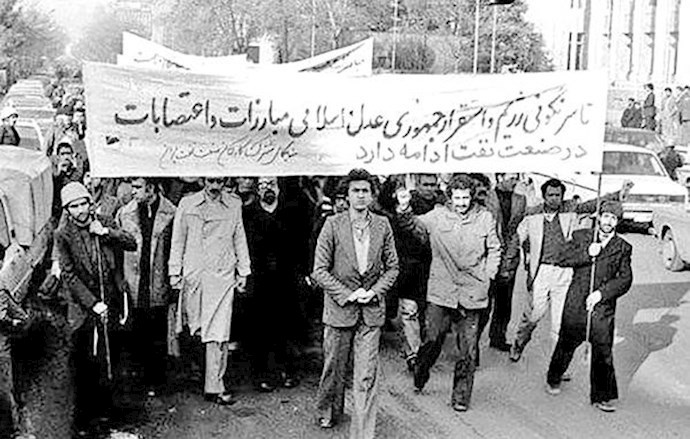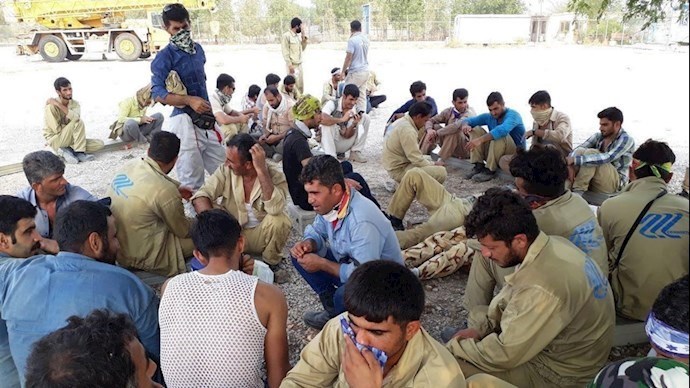Reporting by PMOI/MEK
Iran, August 15, 2020—The strike by workers in Iran’s oil, natural gas and petrochemical industries continues. The mullahs’ regime, helpless from the workers’ strike and in fear of its expanding scope, has resorted to various deceptive measures to wind down the workers’ strike. Regime officials have attempted to offer financial incentives to a number of workers with various pledges and money. Employers have promised the workers to raise their wages. They even offered up to 100 million rials (around $435) to a number of workers and asked them to return to work. These attempts have failed.
Fragile state vis-à-vis oil workers’ strike
Obviously, if this regime wanted to pay the workers’ salaries, there would have been no need for such treacherous acts. The anti-labor policies of this regime have left Iran’s workers and toilers desperate and barely making ends meet. They are forced to protest and launch strikes to get their basic rights. Such actions by the regime show its vulnerability and fragility to the strike of workers, especially oil and petrochemical workers. A brief look at the history of the workers’ leading to the 1979 revolution portrays the decisive role of the workers’ strike and its importance in the current situation.
Oil workers’ strike and its role in overthrowing the Shah
Oil workers went on strike eight months after the start of the general uprising against the monarchy back in 1978. The 8 September 1978 massacre was the motivation force behind the strike. One day after the massacre, strikes by oil workers began in the cities of Tehran, Tabriz, Abadan, Isfahan, Shiraz and Kermanshah.

Strikes by Iran’s oil workers in 1978
The Abadan refinery in southwest Iran was one of the focal points of those strike. In 1978 this site had about 20,000 permanent workers, contractors, and employees. To deceive the workers, the Shah’s regime offered them a ten-percent exorbitant salary, a decrease in housing costs, and doubling their food money. However, none of these incentives paid off and workers at the refinery went on a general strike.
The protesting workers prevented divisions among their ranks, and a day later the parts that had not yet ceased to work, such as their processing unit, joined the strike. As the protests progressed, the workers called for the abolition of martial law throughout the country, the unconditional release of all political prisoners, a ban on police and army interference in the oil industry, regime officials addressing teachers’ demands, and the prosecution of those responsible for killing protesters.
The strike transformed the workers into a united mass. In the face of a siege imposed on the refinery by the Shah regime’s Imperial Guard and armored vehicles, the workers did not back down from their demands and were not intimidated. The strike continued until February 11, 1979, the collapse of the Shah dictatorship.
Fear of repeating an experience
The mullahs’ regime, experiencing the 1979 revolution, is in a state of panic as oil sector workers in many cities launch and continue their protests and strikes. Regime officials are resorting to a variety of deceptive measures and lies to prevent the workers from continuing their strikes. Reflecting on this fear, the state-run Sharq daily warned government officials in several articles. “Officials will face costly consequences if they do not listen to the workers’ voices in time, fail to live up to the workers’ demands and attribute the workers’ protests to our enemies,” Sharq wrote on August 14.
“A decent situation for work is one of the requirements for the country’s development. A person who is desperate and demands justice for a decent life and work should not drown dignity and honor in silence, out of fear. Workers have the right to unite, protect their individual and group interests, and to be able to pursue their demands systematically,” the Sharq piece added.
According to the mullahs’ own Labor Law, approved on November 20, 1990, any type of sit-in, strike or demonstration is prohibited. Establishing any type of trade union outside the direct control of the government is seen as an attempt to overthrow the government.
Certainly, the hardworking and honorable Iranian oil sector workers will be able to prove once again their historical role in bringing tyranny to its knees and prevent the mullahs’ regime from using oil money to suppress the nation.





